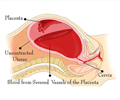The Bill & Melinda Gates Foundation has given UCSF researchers nearly $1.4 million to expand African research trials on an innovative anti-shock garment that aims to reduce maternal deaths in remote areas worldwide.
The trials in Zambia and Zimbabwe will help determine whether early use of the non-pneumatic anti-shock garment, or NASG, by midwives at primary health care centers can reduce mortality and morbidity among women suffering from obstetric hemorrhage.If successful, these trials will open the door to use the garment throughout the developing world, where 99 percent of the world's maternal mortalities occur, according to Suellen Miller, CNM, PhD, director of Safe Motherhood Programs of the UCSF Women's Global Health Imperative. Miller has pilot-tested the garment in tertiary care centers in Egypt and Nigeria over the past four years.
"Obstetric hemorrhage is the most common cause of maternal mortality and morbidity
in developing countries, where the vast majority of women give birth at home or in
unequipped primary health care centers, many miles from emergency obstetric care,"
said Miller, who also is an associate professor in the UCSF Department of
Advertisement
Excellence in Women's Health.
Advertisement
The World Health Organization estimates that 529,000 women died in pregnancy or childbirth in the year 2000, more than 99 percent of whom were in developing countries. Obstetric hemorrhage accounts for approximately 25-30 percent of all maternal deaths.
The Gates Foundation grant joins a $1.9 million grant from the National Institutes of Health to ensure that the trials can proceed. The current funding also builds upon nearly $2 million in previous grants from the John D. and Catherine T. MacArthur Foundation to UCSF for the preliminary pilot studies.
The NASG is a low-cost and reusable body suit made of articulated segments of stretchy neoprene that wrap around a patient's lower trunk and legs. When the suit's Velcro closures are tightened around the patient's body, the compression decreases blood loss and forces blood pooling in the lower extremities back to the heart, lungs, and brain, which reverses shock.
Sheer distance is only one cause of the delay in obtaining emergency obstetric services that can cost a woman her life. Miller identified four other crucial delays: assessing that a woman is hemorrhaging; deciding to seek medical care; obtaining transportation to a medical facility; and obtaining prompt appropriate emergency care upon arrival.
"By stocking the garment at rural health care centers and training local health workers in the garment's application, we will be able to see whether the garment will be suitable for widespread adoption in developing countries," Miller said.
The NASG already has been shown to effectively reduce mortality and morbidity from shock among women who have had it applied at a referral hospital. The new trials aim to show that morbidity and mortality can be reduced among even larger and more scattered populations whose only direct access to health care is at rural primary
health care centers.
Miller and her colleagues, Stacie E. Geller and Marci G. Adams of the University of
Illinois at Chicago, have identified the garment as part of a four-part continuum of care for treatment of postpartum hemorrhage (CC-PPH), which is scheduled to appear as an article in the December 2007 issue of the "International Journal of Fertility and Women's Medicine." The CC-PPH would include the availability of a uterus-contracting drug and the anti-shock garment to decrease blood flow and stabilize a hemorrhaging patient, a standard for assessing blood loss, and systemization of communication, transportation and referral.
The four-step CC-PPH model is achievable even at primary health care centers in low-resource countries, Miller said. In October, the MacArthur Foundation granted
$10.75 million to Pathfinder International to implement a similar continuum of care model for post-partum hemorrhage in Nigeria and India.
Results of the pilot study of the garment in Egypt, which were published in the
April 2006 issue of the "British Journal of Obstetrics and Gynecology," showed a 69 percent decrease in death and severe illness when the NASG was used for obstetrical
hemorrhage patients.
UCSF is a leading university dedicated to defining health worldwide through advanced biomedical research, graduate-level education in the life sciences and health professions, and excellence in patient care.
Source: UCSF News service
Source-Medindia
SRM/R







